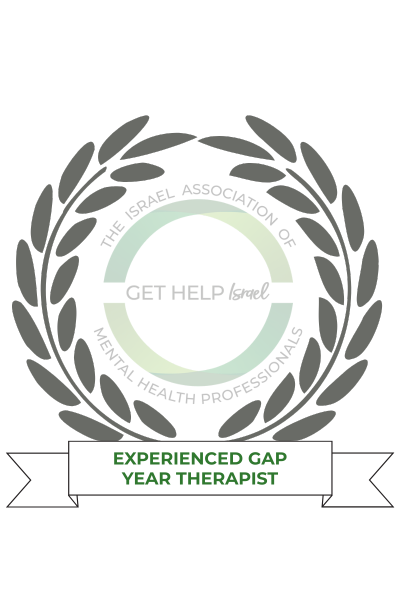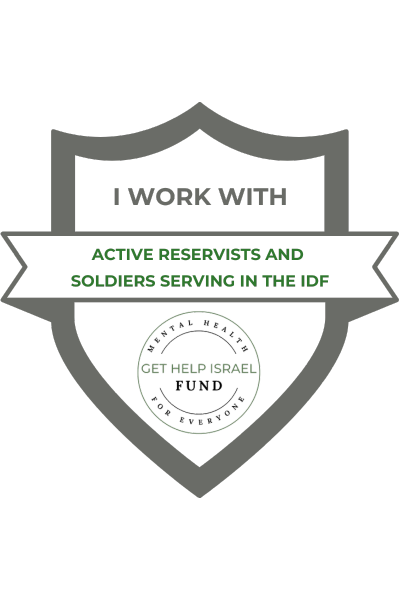Yonit Schorr
Credentials
Finances
Licensed Abroad
- Rachel Imenu
- Jerusalem
Yonit Schorr
 Verified
Verified
Credentials
Clinical Psychologist
PhD
Finances
350-500 NIS
None
Sliding Scale | Free Consultation | Lone Soldier Discount | Student Discount
ABOUT THE THERAPIST
I am a US-trained clinical psychologist, licensed in both the US (Massachusetts) and Israel (מומחה- Expert in Clinical Psychology). My training is within a scientist-practitioner model which means that the therapy I provide is informed by the latest research and is evidence-based so that you receive care that is shown to be effective.
I will work to integrate well-researched strategies into an individualized treatment approach that is tailored to your style, needs, and goals and delivered with a non-judgmental, accepting, and compassionate approach. I believe strongly in a collaborative approach that respects the dignity, autonomy, and strengths of everyone I work with. You are the expert on your personal history and experience and bring an understanding of what has and has not worked for you in the past. I bring my clinical training, knowledge of proven clinical strategies and techniques, and my experience working with others in similar situations. I will partner with you to help you progress toward living a life consistent with your values and the things that matter most to you. We will work together to help you learn skills and strategies in order to develop more adaptive ways of handling difficult situations well after you finish therapy.
My background: I became interested in psychology as an undergraduate during a "semester-abroad" spent studying at Hebrew University. My semester in Jerusalem coincided with a period of on-going terrorist attacks and I was struck by the seeming resilience of many individuals and society I observed around me. I wondered about the sources of this ability to go on in spite of everything, but also wondered what psychological cost of this response. I returned to the US determined to study how people cope with on-going difficult and even traumatic situations with the hopes of eventually returning to Israel to apply this knowledge in the service of helping people.
I received a BA with Honors in Psychology from Barnard College, Columbia University and a Masters and PhD in Clinical Psychology from the University of Massachusetts in Boston. During my training, I worked in counseling centers, out-patient, day and inpatient treatment facilities, and academic-research hospitals specializing in civilian and military populations. I completed an American Psychological Association (APA) clinical internship at the May Institute in Boston followed by a multi-year post-doctoral fellowship affiliated with the National Center for PTSD at the Boston Veterans Administration Hospital where I then stayed on as a staff Clinical Research Psychologist until making aliyah in 2014. Through my work at the VA, I developed an expertise in the clinical treatment and research of trauma and other military related distress. I have published academic articles related to the treatment of grief, PTSD, and Moral Injury. I have lectured to professional audiences here in Israel on Moral Injury.
I am especially interested and passionate about supporting soldiers and veterans integrate their military experiences in a healthy way that helps them move forward with their lives. I also work with non-military related distress and trauma, anxiety, depression, adjustment disorders and a range of other life challenges. I offer a free initial consultation phone call to determine whether treatment with me is the right fit for you. I look forward to speaking with you.
QUALIFICATIONS
PhD
University of Massachusetts
2005
Degree
PhDEducation
University of MassachusettsYear of Graduation
2005Years in Practice
14
REGISTERED PSYCHOLOGIST IN ISRAEL
Registration in Pinkas Hapsichologim
27-146007
Mumche License Number
27-37795
LICENSED ABROAD
License Category
PsychologistLicense Number
Massachusetts 9128DISTANCE COUNSELING
Telephone Counseling, Online Therapy
PRIMARY SPECIALTIES
Adjustments
Anxiety / Panic
Depression
Grief
Life Transitions
ADDITIONAL SPECIALTIES
Anger Management
Family Issues
Infertility
Life Transitions
Mood Disorders
Obsessive Compulsive Disorder (OCD)
Parenting Issues / Training
Personality Disorders
Phobias
Self-Esteem
Stress Management
Trauma / Post Traumatic Stress Disorder PTSD
CLIENT FOCUS
Population
Adults
Languages Spoken
English
TREATMENT APPROACH
Acceptance and Commitment Therapy (ACT)Acceptance and Commitment Therapy (ACT) is a form of psychotherapy that encourages individuals to accept their thoughts, feelings, and experiences without judgment and to use them as tools to help them to make changes in their lives that are consistent with their values. It is based on the idea that by changing the way we think about our inner experiences, we can reduce emotional distress and increase our sense of well-being.
Cognitive Behavioral Therapy (CBT)Cognitive Behavioral Therapy (CBT) is a type of psychotherapy that focuses on how one's thoughts, feelings and behaviors are connected and can be changed. It is based on the idea that how we think (cognition) and how we feel (emotion) can influence how we behave. CBT helps people identify and challenge distorted thinking and replace it with more balanced thinking, leading to improved mood and behavior. ‘Homework’, usually containing practical writing exercises, is often completed by the client between sessions to reinforce the therapy. Examples of tools that practitioners often use are journaling, challenging beliefs, and mindfulness.
Cognitive Processing TherapyCognitive Processing Therapy is used to treat trauma and PTSD. During therapy, clients identify and understand their beliefs about their responses to their trauma. Inspecting their beliefs often leads clients to understand their emotions and thoughts in relation to the trauma. When the client is ready, practitioners give them tools to challenge their thoughts of the trauma as well as provide homework to solidify what they learned in sessions. In the later stages of therapy, practitioners teach clients how belief systems (about safety, self-esteem, trust, intimate relationships, control, and power) can change after trauma.
Dialectical Behavior Therapy (DBT)Dialectical Behavior Therapy (DBT) is a type of cognitive-behavioral therapy developed by Marsha Linehan to help people learn to better manage and cope with emotions and stress. It focuses on developing skills and strategies to help regulate emotions, improve relationships and communication, and reduce self-destructive behaviors. Through DBT, people learn to identify and modify unhealthy thoughts and behaviors, while also learning to accept and validate their own feelings. DBT teaches skills to help individuals become aware of and accept and regulate their emotions, tolerate distress, and improve interpersonal relationships.
Guided ImageryGuided imagery is a form of visualization used for relaxation and healing. It uses the power of the imagination to create positive changes in a person's thoughts, feelings, and behaviors. It is also used to reduce stress and anxiety, cope with physical and emotional pain, increase motivation, confidence, and self-esteem, and to improve focus and concentration. During a guided imagery session, the practitioner will guide the client through a series of visualizations, using words and descriptions to help them create mental images in their mind. These visualizations can take many forms, such as a comforting place from the past or the client’s future goals.
Psychodynamic TherapyPsychodynamic therapy is a form of therapy that focuses on the unconscious mind and how it affects behavior. It works to help people understand and work through past experiences and feelings that may be causing difficulties in the present. This type of therapy encourages individuals to explore their emotions, relationships, and behaviors in order to gain insight into their current difficulties. It can help individuals better understand themselves and their motivations, and gain insight into how past events have impacted their current lives. People tend to develop defense mechanisms when faced with challenges in life. Defense mechanisms may keep painful feelings, memories, and experiences in the unconscious. A few common defense mechanisms include: denial, repression, and rationalization. Psychodynamic therapists encourage people to speak freely about their emotions, desires, and fears. Being open may help uncover vulnerable feelings that have been pushed out of conscious awareness. According to psychodynamic theory, behavior is influenced by unconscious thought. Once painful feelings are brought forth and processed, the defense mechanisms are no longer needed and a person in treatment can start changing unhelpful patterns when coping with life’s challenges.
Adaptive Disclosure for PTSD/Grief/Moral Injury
SERVICES OFFERED
Individual Therapy
Consultation
PROUD PARTICIPANT

Therapist's Experience with Gap Year Students
Leaving home for the first time, Gap Year can be a stressful time, as well as one full of opportunity for self exploration and growth. Over the last 10 years, I have had the privilege to accompany many students from many different institutions on this journey.

 Verified
Verified


